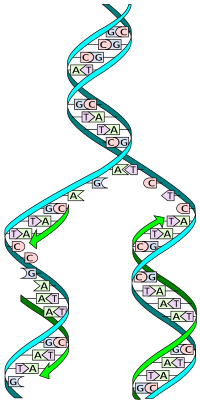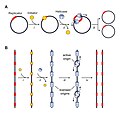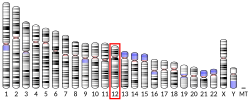T7 DNA helicase (gp4) is a hexameric motor protein encoded by T7 phages that uses energy from dTTP hydrolysis to process unidirectionally along single...
5 KB (538 words) - 17:10, 27 August 2024
T7 DNA polymerase is an enzyme used during the DNA replication of the T7 bacteriophage. During this process, the DNA polymerase “reads” existing DNA strands...
22 KB (2,540 words) - 09:21, 17 June 2024
for helicases. The human genome codes for 95 non-redundant helicases: 64 RNA helicases and 31 DNA helicases. Many cellular processes, such as DNA replication...
56 KB (6,916 words) - 17:01, 27 August 2024
Washington MT, Moore KC, Patel SS (May 1997). "The dTTPase mechanism of T7 DNA helicase resembles the binding change mechanism of the F1-ATPase". Proceedings...
119 KB (14,646 words) - 22:02, 3 July 2024
T7 or T-7 may refer to: Thoracic vertebra 7 Thoracic spinal nerve 7 T7 phage, a virus used in the study of biological systems T7 DNA Helicase, a hexameric...
1 KB (250 words) - 09:57, 3 May 2024
Primase (redirect from DNA primase)
have extra functions, if given the right domains. The T7 phage gp4 is a DnaG primase-helicase fusion, and performs both functions in replication. Bocquier...
20 KB (2,371 words) - 23:07, 9 November 2024
Topoisomerases are required for many processes involving DNA, such as DNA replication and transcription. Helicases are proteins that are a type of molecular motor...
166 KB (17,843 words) - 13:16, 19 September 2024
of an organism. Unwinding of DNA at the origin and synthesis of new strands, accommodated by an enzyme known as helicase, results in replication forks...
60 KB (7,286 words) - 08:26, 2 July 2024
polymerase onto the DNA, which increases the rate of synthesis. Phage T7 has the simplest known DNA replisome, consisting of a helicase and primase that...
17 KB (1,770 words) - 07:21, 27 August 2024
coli DnaG associates through noncovalent interactions with bacterial replicative helicase DnaB to perform its primase activity, with three DnaG primase...
20 KB (2,544 words) - 14:58, 5 November 2024
generation. Before replication can take place, an enzyme called helicase unwinds the DNA molecule from its tightly woven form, in the process breaking the...
59 KB (7,090 words) - 06:49, 30 June 2024
Origin of replication (redirect from DNA replication origin)
initiators (often with the help of co-loader proteins) deposit replicative helicases onto DNA, which subsequently drive the recruitment of additional replisome...
113 KB (12,561 words) - 17:02, 14 May 2024
Polymerase (redirect from DNA-directed RNA polymerase)
DNA-directed RNA polymerase (DdRP, RNAP) Multi-subunit (msDdRP): RNA polymerase I, RNA polymerase II, RNA polymerase III Single-subunit (ssDdRP): T7 RNA...
7 KB (673 words) - 23:08, 9 July 2024
RNA polymerase (redirect from Dna-directed rna polymerases)
synthesize RNA from a DNA template. Using the enzyme helicase, RNAP locally opens the double-stranded DNA so that one strand of the exposed nucleotides can...
43 KB (5,109 words) - 08:28, 28 October 2024
similarity to the phage T7 primase/helicase (GP4) and other hexameric ring helicases. The twinkle protein colocalizes with mtDNA in mitochondrial nucleoids...
15 KB (1,860 words) - 16:07, 2 November 2024
ribonucleoside monophosphates on template inhibit DNA replication by T7 DNA polymerase or by T7 polymerase and helicase complex". Biochimie. 151: 128–138. doi:10...
5 KB (682 words) - 12:58, 27 August 2024
Rolling circle replication (redirect from Rolling circle DNA replication)
the nicked strand as single-stranded DNA. Displacement of the nicked strand is carried out by a host-encoded helicase called PcrA (the abbreviation standing...
24 KB (2,920 words) - 14:34, 16 July 2024
DNA polymerase epsilon is a member of the DNA polymerase family of enzymes found in eukaryotes. It is composed of the following four subunits: POLE (central...
3 KB (336 words) - 09:50, 4 November 2023
proteins and cruciform DNA serve a role in origin firing which in turn will activate DNA helicase to begin the process of DNA replication. The 14-3-3...
28 KB (3,447 words) - 16:00, 30 March 2024
and T7 DNA helicase in 2004. Richardson used these enzymes to further analyze DNA, develop sequencing reagents, and characterize the mechanisms of DNA replication...
18 KB (1,954 words) - 10:21, 26 October 2024
Variants of PCR (section DNA Polymerases)
cycling through denaturation and annealing/extension steps. DNA Helicase, an enzyme that unwinds DNA, is used in place of thermal denaturation. Loop-mediated...
32 KB (4,102 words) - 05:25, 7 February 2024
Replicon (genetics) (category DNA replication)
replicator is the entire DNA sequence (including, but not limited to the origin of replication) required to direct the initiation of DNA replication. The initiator...
6 KB (634 words) - 22:52, 2 December 2023
Genome instability (section DNA Replication Defects)
2007). "A persistent RNA-DNA hybrid formed by transcription of the Friedreich ataxia triplet repeat in live bacteria, and by T7 RNAP in vitro". Nucleic...
38 KB (4,560 words) - 18:55, 4 August 2024
Analysis of crossover junction endodeoxyribonucleases from bacteriophages (T7 endonuclease I), bacteria (RuvC), fungi (GEN1) and humans (hMus81-Eme1) have...
12 KB (1,215 words) - 12:48, 1 August 2024
DNA polymerase epsilon catalytic subunit is an enzyme that in humans is encoded by the POLE gene. It is the central catalytic subunit of DNA polymerase...
9 KB (1,103 words) - 12:15, 20 March 2024
Polymerase (DNA-directed), epsilon 4, accessory subunit is a protein that in humans is encoded by the POLE4 gene. POLE4 is a histone-fold protein that...
2 KB (264 words) - 20:32, 27 March 2024
DNA polymerase epsilon subunit 2 is an enzyme that in humans is encoded by the POLE2 gene. POLE2 has been shown to interact with SAP18. GRCh38: Ensembl...
4 KB (523 words) - 22:27, 9 September 2023
DNA polymerase delta subunit 3 is an enzyme that in humans is encoded by the POLD3 gene. It is a component of the DNA polymerase delta complex. POLD3...
6 KB (740 words) - 17:22, 3 December 2023
(stimulator of interferon genes) to detect damaged DNA. The nucleotide either binds to the helicase DDX41, which in turn activates the STING pathway, or...
18 KB (2,035 words) - 09:25, 25 April 2024
RISC activation. Although it was first believed that an ATP-dependent helicase separated these two strands, the process proved to be ATP-independent and...
140 KB (15,409 words) - 08:23, 28 October 2024



















